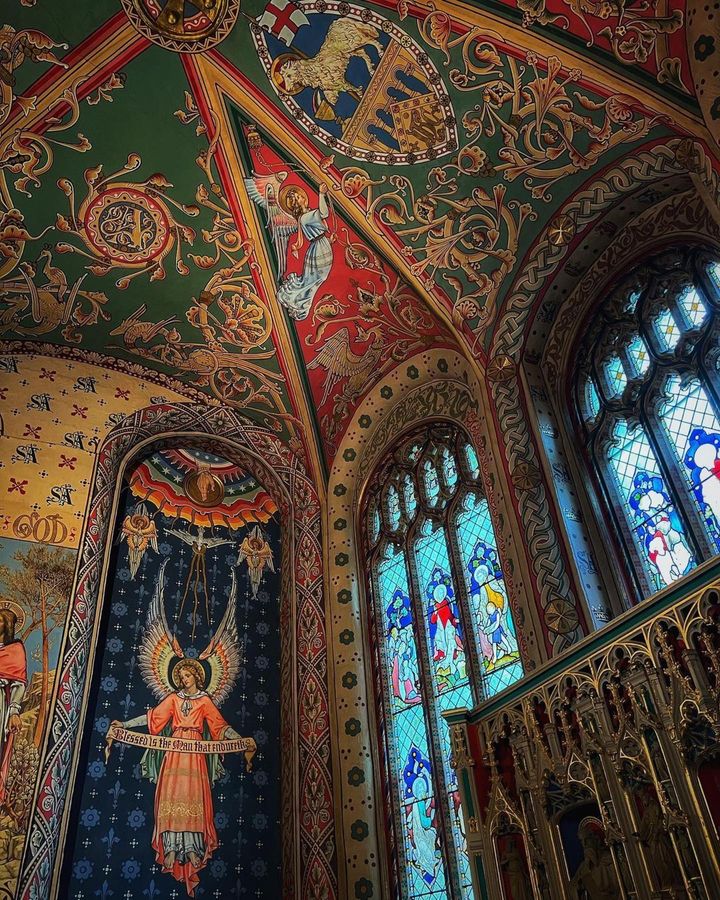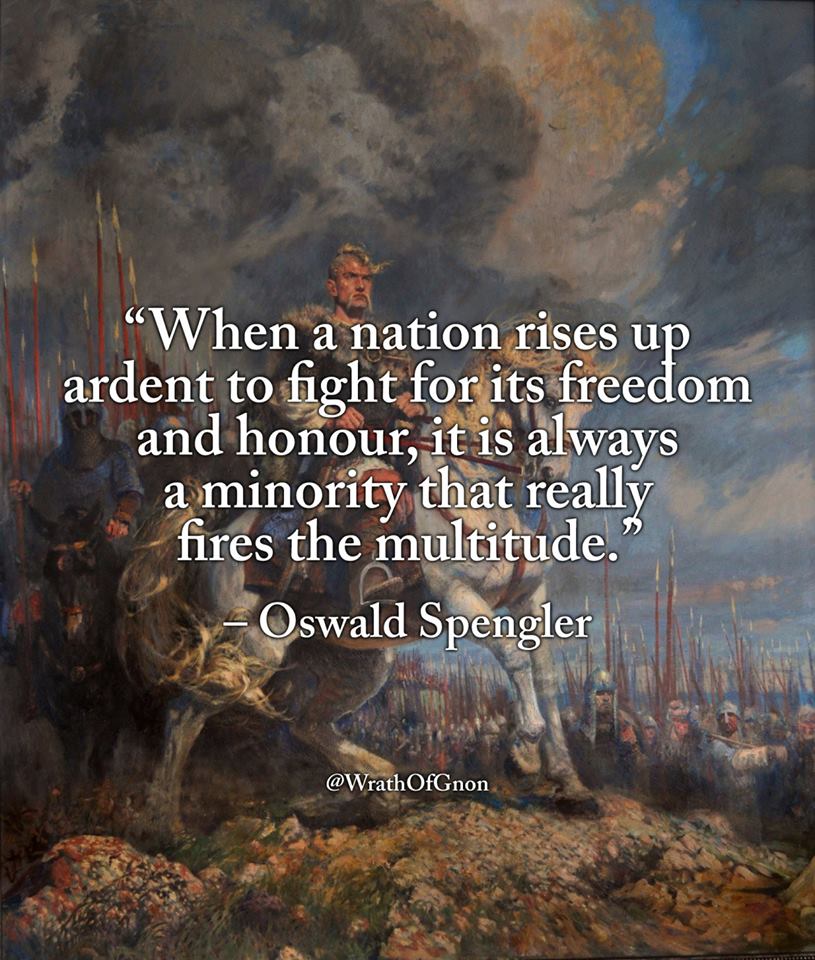A Note About the Future of This Blog
 Embryo Parson Posted on
Embryo Parson Posted on  Sunday, May 7, 2017 at 06:01PM
Sunday, May 7, 2017 at 06:01PM Both the duties of life along with time spent in some reflection have resulted in a certain neglect of this board. I am increasingly caught up in affairs of family and ministry, and as a result I have had to put OJC on the back burner for awhile. But I do intend to get back to it in earnest within a few months, and when I do so, look for a total retasking of this blog.
Yes, Praise The Lord
 Embryo Parson Posted on
Embryo Parson Posted on  Sunday, May 7, 2017 at 05:59PM
Sunday, May 7, 2017 at 05:59PM In the glory of the female voice:
Muscular Christianity
 Embryo Parson Posted on
Embryo Parson Posted on  Sunday, May 7, 2017 at 05:41PM
Sunday, May 7, 2017 at 05:41PM At 2:08 in this video: this is your chant on testosterone.
All human singing is lovely: women alone, men alone, mixed choirs. I will post another video above showing forth the glory of the female voice.
But there is nothing like the glory of the male voice, singing like this.
Patriarchy is on the move, and it's coming back, brothers and sisters. You simply cannot avoid the reality and the force of it, because you can't fight the order of God's creation.
Another Orthodox Insider Writes of the Threat to the Orthodox Church from Within
 Embryo Parson Posted on
Embryo Parson Posted on  Friday, April 14, 2017 at 11:22AM
Friday, April 14, 2017 at 11:22AM In my very first post about the Orthodox Church here at OJC, I mentioned the problem of creeping liberalism in that communion. I cited the concerns of one Orthodox priest, Fr. Gregory Jensen, who writes of how he and his fellow Orthodox Christianz "find ourselves in the same position as traditional and observant Roman Catholics, Protestants, Jews or other religious believers" as they are "being attacked not only from the outside but. . . increasingly being undermined from within" by liberalism.
Along comes ROCOR priest Fr. Alexander Webster, writing in the May/June 2017 issue Touchstone about this ongoing threat. It is entitled Three Trojan Horses, and it fully echoes the concerns that Fr. Jensen expressed in the article he penned several years ago. Take some time to read this disturbing piece.
Episcopalianization comes to us all, it would appear. One wonders if the Two One True Churches will, as they claim, forever be bulwarks of unity.
What Is Anglican Patrimony?
 Embryo Parson Posted on
Embryo Parson Posted on  Tuesday, April 4, 2017 at 04:36PM
Tuesday, April 4, 2017 at 04:36PM "It is the name used latterly to refer to that active ferment of Christian activity and culture alive through various phases in the British and English lands, as well as its eccelsial heirs. It did not begin in 1833 with the Assize Sermon, nor in 1660 with the Restoration, nor in 1549 with the Book of Common Prayer, nor in 1534 with the Act of Supremacy, nor in 1213 with Papal feudalism, nor in 664 with the Synod of Whitby. All these moments initiated major episodes in the life and practice of this tradition or "school" of the Church, the *English School,* influences upon it being varied: anchoritic, Benedictine/Cistercian, Franciscan, Dominican, to name but a few. Yet Anglican patrimony actively ferments in any age through growing relationship in Christ, despite its often turbulent and chaotic social history. It issues in a comprehensive way of being Christian -- through liturgy and hymnody, as well as less tangibly through expressions of parochial, pastoral, and ascetical theology -- and indeed at its best constitutes a school that is a full member of the glorious family of Catholic schools of spirituality."
-- Fr Matthew Dallman
 Anglican Spiritual Life,
Anglican Spiritual Life,  Ascetical Theology,
Ascetical Theology,  Benedictine Spirituality,
Benedictine Spirituality,  Book of Common Prayer,
Book of Common Prayer,  Caroline Divines,
Caroline Divines,  Continuing Anglicanism,
Continuing Anglicanism,  English Reformation,
English Reformation,  Historical Theology,
Historical Theology,  Holiness,
Holiness,  Monasticism,
Monasticism,  Mysticism,
Mysticism,  Oxford Movement,
Oxford Movement,  The Problem of Anglican Identity,
The Problem of Anglican Identity,  Traditional Anglicanism,
Traditional Anglicanism,  Why Anglicanism?
Why Anglicanism? How to Think About Vladimir Putin
 Embryo Parson Posted on
Embryo Parson Posted on  Wednesday, March 29, 2017 at 09:31PM
Wednesday, March 29, 2017 at 09:31PM Keep in mind that this article comes from an organ of the neocon-leaning Hillsdale College, penned by an editor of the über-neocon rag THE WEEKLY STANDARD. Just ponder that for a moment. Hell has just frozen over.
Russia is not our enemy. An enemy of the American Deep State, neoconservatism and liberal-leftism, yes. But not our enemy.
How John Calvin Made Me a Catholic
 Embryo Parson Posted on
Embryo Parson Posted on  Tuesday, March 28, 2017 at 08:50PM
Tuesday, March 28, 2017 at 08:50PM Anglicans can agree. Calvinism almost destroyed Anglicanism. Almost.
No room here for "Reformation Anglicanism." The Catholic Faith will do.
To Become a "Continuing" Anglican. . . Or Not
 Embryo Parson Posted on
Embryo Parson Posted on  Monday, March 27, 2017 at 01:01PM
Monday, March 27, 2017 at 01:01PM By Bishop Robert Todd Giffin, Ordinary of the Diocese of Mid-America, Anglican Province of America:
After fifteen years in the continuing Anglican Church, five of those as a bishop in the Anglican Province of America (APA), and 32 prior years as a cradle Canterbury Anglican, I’ve seen a lot of friends and acquaintances come home to our little corner of Christ's Church.
And yet, not all of these journeys have worked out. I love the Anglican Church, and so I find it difficult to understand how a person could not see the beauty in our faith, leaving it all behind. However, I do think that there are certain factors that influence and even cause these abandonments. I left a couple of times myself along my journey. Yet, in the end, the continuing Anglican Church is my home.
Many times, inquirers, particularly current and former Episcopalians, approach the continuing Anglican Church as a safe haven from controversy and scandal. If anyone knows our history, however, this is truly a mistaken viewpoint!
This perspective presupposes a defective Christology—one that fails to account for the anthropos of the theanthropic (Divine-human) Church. As the Body of Christ, the Church is a Divine-human organism, just as with the Person of Jesus Christ, the God-Man. While the Church is certainly Divine in one respect, She is also comprised of human beings—human beings that can, and do, err. Failing to remember (or be taught) this, we are scandalized and even lose our faith in the Church, not distinguishing between the divine and human natures, or confusing them.
Another issue is becoming a continuing Anglican because one thinks the Anglican Church ‘owes them’ for their time spent in the Episcopal Church (or C of E, Anglican Church of Canada, Australia, etc.), rewarding them with ordination, titles, and possibly a purple shirt or other trappings.
Those who were laity in the Episcopal Church or other denominations have no guarantees they will become clergy in the continuing Anglican Church, at least in my Diocese! It doesn’t matter how long they have served, or how extensive their education. Holy Orders are a mystery (sacrament) of the Church, and the Spirit blows where it will. Becoming a traditional Anglican Christian means being willing to submit to the Church and Her bishops, who might not be interested in ordaining you. If anyone is unwilling or not ready to submit to the Church in all areas of life, they should stay away—until or unless they are ready to do so.
On the other hand, there are cases where a person rejects the continuing Anglican Church for what I would consider to be erroneous reasons.
For example, I know someone that spent over a year studying almost every aspect of traditional Anglicanism, including many fathers of the Church and practically every nuance of both doctrine and history. However, they rarely spent any time in traditional Anglican worship services or their local parish, developed no relationship with a priest, and did not engage their spouse or family in their studies and interest in the Anglican Church.
If someone is approaching the continuing Anglican Church from a purely rationalistic standpoint, they will almost surely find it wanting. The continuing Anglican Church does not fit into the paradigms of modernity; it is not a wholly rational faith. This doesn’t mean we shun catechesis, but just that it’s not always done in the same way everywhere—and where it exists, it’s likely different from what a catechumen might expect or even hope. We must be willing to embrace mystery, to submit to other authorities, and to ultimately submit to the Church Herself. Those who approach continuing Anglicanism looking for all their questions to be answered in a neat-and-tidy manner will be deeply disappointed, left rejecting a branch of Christ's Church to which they’ve only been shortly exposed.
So why should someone desire to join the continuing Anglican Church?
For me, the one and only valid, core reason is because a person truly desires to be part of the Body of Christ. Because we, as traditional Anglicans, confess and believe in the “one holy, catholic and apostolic Church,” this means we are not looking for a Church that fits our own preferences and ideals, even though we are English by tradition, but rather one that teaches us what our preferences should be. We are not seeking to reform or to teach the Church how it should do things, but are rather seeking to be formed by the Church and to learn how we should be doing things as faithful Christians.
Now, I don’t share all of this in order to dissuade anyone from becoming a traditional Anglican, but rather to encourage those who are on such a journey—or who have strayed away from one that began on the wrong foot.
Becoming a continuing Anglican is not easy, nor does it promise great happiness or success in this life. In fact, it promises a Cross and joining with Christ in both suffering and humiliation. We have many small missions and parishes with few if any monetary resources, and relatively few stipendiary posts for our clergy.
But if you are still intrigued and drawn to the continuing Anglican Church, considering all of these disclaimers, then do so with faith, reverence, and a healthy fear of God. Pray for the Lord’s mercy, and you can find the strength to endure to the end. Believe in the continuing Anglican Church as a fully revealed member of the Body of Christ, and the continuing Anglican Church—flawed people and all—will help lead you down the right path.
But don’t do it for all the wrong reasons.
What Is Anglicanism?
 Embryo Parson Posted on
Embryo Parson Posted on  Monday, March 20, 2017 at 09:10PM
Monday, March 20, 2017 at 09:10PM Anglicanism refers to an Apostolic and Catholic church founded in the British Isles by Celtic and Roman missionaries, which entered fully into the the theological and mystical mindset of the Latin church, which had both a Reformation AND a Counter-Reformation, followed by an infestation of Enlightenment liberalism, and 100 years later an infestation of Pentecostalism, the result being that Reformation Anglicanism, Counter-Reformation Anglicanism, modern liberal-leftism and Pentecostalism pull it in four directions. Thus the vexing issue of Anglican identity.
That vexing problem will only be solved when all conservative Anglicans decide to take seriously the claim of historic Anglican divinity that Anglicanism is merely the faith of the Apostles and Fathers. If and when they do, they will throw off BOTH Calvinist and Enlightenment radicalism, which are arguably cousins, if not brothers, and they will forsake the mysticism of Pentecostalism for the Catholic spirituality of Augustine, the Cappadocians, medieval English mystics such as Julian of Norwich and Richard Rolle, the Caroline Divines and the Tractarians.
Forget about the liberals, who represent another religion entirely. They will eventually just waste away.
 "Three Streams" Anglicanism,
"Three Streams" Anglicanism,  ACNA,
ACNA,  AMiA,
AMiA,  Anglican Realignment,
Anglican Realignment,  Anglo-Calvinism,
Anglo-Calvinism,  Benedictine Spirituality,
Benedictine Spirituality,  Caroline Divines,
Caroline Divines,  Church of England,
Church of England,  Continuing Anglicanism,
Continuing Anglicanism,  English Reformation,
English Reformation,  Episcopal Church,
Episcopal Church,  Future of Protestantism,
Future of Protestantism,  John Calvin,
John Calvin,  Liberal-leftism,
Liberal-leftism,  Neo-Anglicanism,
Neo-Anglicanism,  The Problem of Anglican Identity,
The Problem of Anglican Identity,  Traditional Anglicanism
Traditional Anglicanism Quote of the Day
 Embryo Parson Posted on
Embryo Parson Posted on  Monday, March 20, 2017 at 06:47PM
Monday, March 20, 2017 at 06:47PM J.R.R. Tolkien’s Vision of Just War
 Embryo Parson Posted on
Embryo Parson Posted on  Sunday, March 19, 2017 at 11:20PM
Sunday, March 19, 2017 at 11:20PM From The Imaginative Conservative.
Too many pundits, politicians, and priests nowadays treat war as a relic of a barbaric past. President Obama speaks for many when he denounces ISIS and other terrorist groups by invoking the date on the calendar. Nevertheless, he has found himself re-entering a war in the Middle East that he first opposed and then claimed to have won, appearing more interested in the short-term need to be seen “doing something” than in pursuing and articulating a coherent strategy for victory.
Such ambivalence about war is very much the spirit of the age in the industrialized West. But militants such as ISIS care not a wit what year it is. Now as much as ever we need clear thinking on the nature and proper conduct of war, ideally in an accessible form.
Happily, J.R.R. Tolkien offers a rich and extended meditation on the Just War tradition in his novels The Hobbit and The Lord of the Rings, an exploration the Peter Jackson movie adaptations hint at but hardly exhaust.
The Just War tradition has its roots in the great minds of Christendom, from Augustine to Aquinas. Given Tolkien’s background, we should not be surprised to find him in sympathy with it. He was a world-renowned Oxford scholar of medieval languages and literature, an orthodox Catholic, a combat veteran of World War I and a thorough conservative. The Just War tradition was very much his tradition.
I've Been Busy, and Other Matters
 Embryo Parson Posted on
Embryo Parson Posted on  Wednesday, March 15, 2017 at 07:32PM
Wednesday, March 15, 2017 at 07:32PM With family, with business, with church.
And with Lent, trying to keep my bloody mouth shut.
Hope you are all doing the same thing. The affairs of life, and especially the affairs of Christ, are infinitely more important than this dullard's blog.
Keep your priorities straight, and in that connection, these three books are now available for purchase. A $50 investment. I bid you, buy them.
May you all have a blessed and profitable Lent, as we all prepare for the Feast of Feasts.
Smoking Spiritualized
 Embryo Parson Posted on
Embryo Parson Posted on  Thursday, February 9, 2017 at 07:15PM
Thursday, February 9, 2017 at 07:15PM by Ralph Erskine
PART I
This Indian weed now wither'd quite, ...
'Tho' green at noon, cut down at night,
Shows thy decay;
All flesh is hay.
Thus think, and smoke tobacco.
The pipe so lily-like and weak,
Does thus thy mortal state bespeak.
Thou art ev'n such,
Gone with a touch.
Thus think, and smoke tobacco.
And when the smoke ascends on high,
Then thou behold'st the vanity
Of worldly stuff,
Gone with a puff.
Thus think, and smoke tobacco.
And when the pipe grows foul within,
Think on thy soul defil'd with sin;
For then the fire,
It does require.
Thus think, and smoke tobacco.
And seest the ashes cast away;
Then to thyself thou mayest say
That to the dust
Return thou must.
Thus think, and smoke tobacco.
PART II.
Was this small plant for thee cut down?
So was the plant of great renown;
Which mercy sends
For nobler ends.
Thus think, and smoke tobacco.
Doth juice medicinal proceed
From such a naughty foreign weed?
Then what's the pow'r
Of Jesse's flow'r?
Thus think, and smoke tobacco.
The promise, like the pipe, inlays,
And by the mouth of faith conveys
What virtue flows
From Sharon's rose.
Thus think, and smoke tobacco.
In vain th' unlighted pipe you blow;
Your pains in inward means are so,
'Till heav'nly fire
Thy heart inspire.
Thus think, and smoke tobacco.
The smoke, like burning incense tow'rs
So should a praying heart of yours,
With ardent cries,
Surmount the skies.
Thus think, and smoke tobacco.
Quote of the Day II
 Embryo Parson Posted on
Embryo Parson Posted on  Monday, January 30, 2017 at 11:15PM
Monday, January 30, 2017 at 11:15PM "A Catholic group has formally asked the Trump administration to investigate the activities of the last administration as it concerns applying pressure to promote a leftist agenda withinthe RC church.
Could this kind of thing explain the presence of progressive elements in TEC and ACNA?" - Brian Barber
http://remnantnewspaper.com/web/index.php/articles/item/3001-did-vatican-attempt-to-influence-u-s-election-catholics-ask-trump-administration-to-investigate
Quote of the Day
 Embryo Parson Posted on
Embryo Parson Posted on  Monday, January 30, 2017 at 05:02PM
Monday, January 30, 2017 at 05:02PM "Could it be even much simpler, that Trump is merely enforcing the law as it is written as his predecessor didn't? Gadzooks, that would be a novel idea. I'd bet not one, NOT ONE, rioter, commenter, snowflake (christian or not), has actually read the law on the matter and yet they're protesting, commenting, and/or opining as if they know the actual legalities on immigration. We're living in a "facts be damned" culture and unfortunately, I see a whole bunch of my fellow Christians succumbing to the spirit of the paid rioters and liberal media. There is no immigration debate folks, there are laws that guide immigration. Some Presidents follow them, and others don't. Simple as that. . . .
My contention is, read the actual law...and the executive order...its much more concise and clear. Helps to avoid all of the speculations put forth by folks who are too focused on the emotions and motives right now instead of the actual laws on the books. As Nash used to say, 'Feelings, wo-wo-wo feelings....'". - William Gunter








